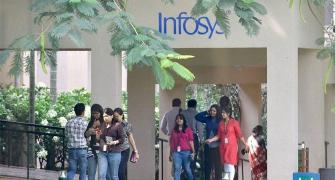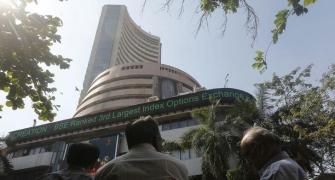 If we can put together a world-class airport, why can't we fix the 'soft' infrastructure parts like the Air Traffic Control, asks Arindam Bhattacharya.
If we can put together a world-class airport, why can't we fix the 'soft' infrastructure parts like the Air Traffic Control, asks Arindam Bhattacharya.
I was sitting in a plane in Mumbai waiting for it to take off for New Delhi when the pilot announced a delay due to congestion at the airport. That in itself was not surprising as it has become a common occurrence.
What indeed was surprising was the fact that the air traffic control (ATC) was not willing to be clear about the extent of delay. The plane did take off finally more than an hour late.
Given that it was midnight when the plane landed in Delhi, most passengers were justifiably upset.
The minister for civil aviation can claim that we are building world-class airports, which is certainly true at least if you look at "hard" infrastructure, but when it comes to "soft" infrastructure and processes, we clearly continue to be pretty obsolete - the ATC cannot even commit to the time of take-off of a scheduled flight with passengers already on board.
Why is it that when the handling capacity of the airport is being planned, the handling capacity of the ATC is not planned simultaneously?
Those who live in south Delhi and travel to Gurgaon every day for work using the outer Ring Road would have rejoiced when the flyovers on the road were completed to give credence to the Delhi chief minister's desire for a signal-free ride to and from NH8.
Of course, they did not consider the genius of the designer of the flyover near Vasant Vihar which had been designed for only one-way movement of the traffic coming to south Delhi from NH8.
So, those going to Gurgaon or to the domestic airport did not see any improvement in their lives - the daily tailbacks at the traffic signals below the spanking new flyover became longer and longer.
When enough number of people started missing flights, the Delhi police suddenly decided to reverse the direction of traffic flow on the flyover by realigning the central verge.
So, those going to Gurgaon and to the airport rejoiced and those travelling in the opposite direction became the suffering citizens of poor planning.
Why couldn't we build a flyover to facilitate movement of traffic in both directions?
As a management consultant with large companies, I find that a key factor for the success of any initiative is the ability to take a "systemic" view of the issue, and then develop a solution which takes into account second- and third-order impacts.
Most environmentalists know about this kind of complex inter-linkage among different parts of natural systems. What is true for natural ecosystems is also true for business systems.
Unfortunately, in many business systems, different functions, agencies or entities that "own" different parts of the ecosystem zealously guard their territory and refuse to either understand or recognise the inter-linkages.
And this results in differing priorities and misalignment of objectives within the same ecosystem (e.g. capacity of handling flights by ATC vs capacity to handle passengers by the Delhi International Airport Limited), leading to these entities working at cross-purposes.
It's not that the concept of system analysis or systemic thinking is new. A google search on this would throw up many definitions. The simplest and the most appropriate one I found relevant for this discussion was: "System analysis is an explicit formal enquiry carried out to help a decision maker identify a better course of action and make a better decision than he would have made."
If we go by this definition, it is pretty much a no-brainer that we should carry out such an analysis for all complex decisions which involve multiple entities, like modernisation of an airport.
The challenge is how to get these different entities together around a common table and bring them round to a common set of objectives?
The prize can be very significant and the failure to do so can prove to be quite costly. One of the key recommendations made in the joint CII-BCG report on the Indian manufacturing industry is setting up of highly competitive manufacturing clusters.
Our research showed that a manufacturing plant located in such a strong cluster can have a cost advantage of 5-8 per cent over competitors located outside a cluster.
Our research also showed that the challenge in developing such a cluster was not building the "muscles and bones" in the form of the infrastructure or attracting sufficient number of companies into the cluster, but developing the "brains" in the form of university linkages and R&D centres.
The question is: how can we bring together various stakeholders in the government - the Ministry of Commerce and Industry, the Ministry of Human Resource Development, the Ministry of Science and Technology, the Planning Commission, etc. - for developing such a world-class cluster so that they take a systemic view of the cluster instead of seeing it through the lens of their respective ministries.
In the draft manufacturing policy put up by the Department of Industrial Policy and Promotion, the Ministry of Industry and Commerce, on its website, the key policy measure proposed is the creation of National Manufacturing and Investment Zones across the country.
This is seen as a key driver of manufacturing growth from the historical 7-8 per cent to 11-12 per cent per annum. While this is a great policy on paper, my fear is that unless we take a systemic view of these manufacturing zones - from linkages to universities and R&D centres to logistic routes and ports - rather than just simplifying some of the rules and regulations regarding environmental clearances, labour laws or the Factories Act, these may well end up like many of the industrial parks dotting India with few signs of any industrial activity.
We are already seeing a dramatic impact of the lack of systemic thinking on our daily lives. In the Greater Kailash colony in New Delhi where I live, colony roads have become public thoroughfare for traffic escaping the chaos of bus rapid transit (BRT).
As more and more cars get added to our cities without fundamental changes in the transportation ecosystem, the gridlocks we have started facing on the roads will only become worse. One can give many more such examples but that is not the point. The point is: Why can't we do something about this?
Here I would like to bring out two facets of our behaviour. A new expat CEO of a large Indian industrial company whom I spoke to was amazed at the lack of detailed cross-functional planning by his senior team before embarking on a major initiative.
At the same time, he admired the speed at which the same team would often respond to a situation once it became a full-blown crisis. The other example was quoted to me by a bureaucrat in the Central government.
He described how one of our senior Cabinet ministers tasked with a seemingly complex problem got all the agencies involved around a table, many of which were not officially under his ministry; set out the objectives clearly; defined the inter-linkages and tasked each agency to come up with its part of the answer at the next meeting for which the date was announced in advance.
Those that did not come prepared got a public dressing down. Pretty soon, all the agencies, even though they did not have a great track record of cooperation amongst themselves, dramatically improved their performance and the minister was able to take a systemic view of the problem and come up with the "better course of action".
These examples reveal some of the root causes which have to be addressed.
We often tend to fly by the seat of our pants and then react to a crisis. We can, however, get the things right if we have a leader who is able to get all the stakeholders around the table and get them agree to a set of common goals either through the sheer force of his personality or through a process of facilitation, and take a more systemic view during the planning process.
The prime minister has gone on record saying that we have good policies and plans, and what we need is stronger implementation monitoring.
I would like to add that what we also need is to build a culture of systemic planning and skills of facilitation to align objectives and goals if we really want to solve the complex issues we face in our lives today. Otherwise, flights will keep getting delayed at our airports.
The author is managing director, the Boston Consulting Group, India.








